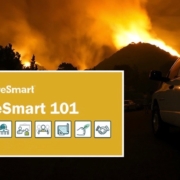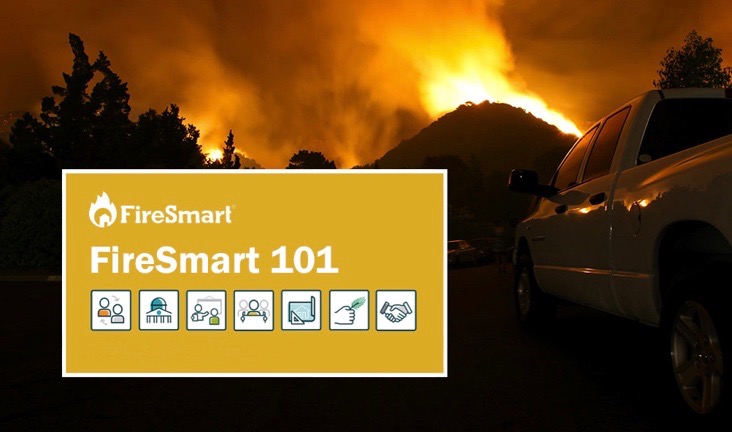Fire Season 2021 – FireSmart and Wildfire Preparedness
What is your wildfire preparedness? Take advantage of FREE resources like FireSmart to help protect your property and you.
As British Columbia welcomes the warmth of late spring, communities across the province are beginning to get out ahead in their wildfire preparedness.
Summer will be here before we know it, and with that glorious hot, dry weather comes the increased risk of wildfire. This spring marks the 5th anniversary of the Fort McMurray wildfires that ravaged so many homes and businesses in our neighbouring province. Those fires are on record for being the costliest insured natural disaster in our nation’s history – claims filed to the tune of almost $3.8 billion.
According to Natural Resources Canada (NRC), approximately 2.5 million hectares (about 6 million football fields) per year have been destroyed by forest and wildfires in Canada over the last 30 years. In terms of cost to land, property and what it takes in fire suppression resources, about $500 million to $1 billion a year.
To help offer a little peace of mind as we brace ourselves for another fire season, we’ve got some good advice as well as a very useful new resource from FireSmart Canada.
Resources to help with Wildfire Preparedness
1. A FREE FireSmart 101 Course
With the increasing frequency of devastating forest and wildfires across Canada, there is a clear need for education to help us take the appropriate precautions to prevent them as best we can. To help educate and better inform, FireSmart Canada has launched a FREE online course.
A 1-hour course, FireSmart 101 provides a good introduction to FireSmart and what it’s about. In addition to addressing how you can protect your home and property, it outlines the primary FireSmart disciplines, defines the FireSmart home ignition zone, as well as other valuable information. You’ll have a brief quiz at the end of the course to ensure that you understand the material. This short program isn’t meant to lecture or talk down to you. Rather, it’s a very accessible tool to help you feel more prepared and empowered to protect your valuable property.
Take the FREE FireSmart 101 course
2. Protect your home and property from forest and wildfires
In addition to the FireSmart 101 course, please feel free to read our comprehensive advice about how to protect your home and property from fire damage. It will give you more information to help you feel more confident that your property is prepared for another wildfire season. Follow forest and wildfire activity throughout the province and the region with the British Columbia interactive wildfire map.
3. Drive safely on BC roads during fire season
The number one rule is, if your route is impacted by forest or wildfire, simply don’t go. Find a safer, alternate route, even if it may be longer. If your route is inundated with smoke, keep windows shut tight and vents closed, with A/C set to recirculate. Breathing toxic, smoke-filled air that can induce coughing and drowsiness and impact your respiratory health.
Keep a fire-related emergency kit in your car. Along with your usual car emergency kit, you may want to be sure you have:
- Mobile phone charger to ensure you can connect for emergency calls.
- Fire retardant blanket for all passengers.
- Bottled water, ideally a 12-24 case.
- Don’t carry flammables such as gas and oil cans if you don’t have to.
4. How You Can Help Prevent Forest Fires
Those fires caused by natural events, such as lightning strikes, are obviously out of our control. However, many forest and wildfires are caused by human beings – they’re preventable! How can you help?
- No smoking when you are near or in forests or brush. It’s obvious, of course, but regardless, every year tossed cigarette butts are the main culprit for forest and wildfires in BC.
- Properly tending to your campfire. Follow campground and regional rules as well as fire danger status reports. Manage and control your fire implements and the campfire. Make sure it’s fully extinguished before leaving it unattended.
- Before burning – yard waste or a campfire – be aware of, and monitor, wind conditions.
- Contain and manage any flammables around your home and property.
- You can call the authorities. It’s not snitching if a neighbour is engaging in irresponsible and potentially hazardous fire practices. Or, if you or someone in your party, has accidentally ignited a fire and is losing control, don’t be afraid to call for help!
Concerns about your home and property and the possibility of forest or wildfires? It’s likely that your home policy (condo, tenant, farm, commercial, and auto) provides the appropriate coverage.
BUT, if you have any questions about your insurance policy and fire – some damage can be limited or excluded altogether – CONTACT US!


